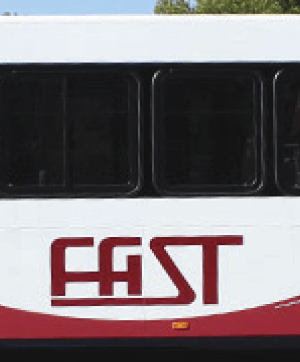 What began three years ago as a cooperative transportation relationship between the Fayetteville Area System of Transit and Fort Bragg’s Transportation office has all but fizzled out. The City of Fayetteville had been approached by former Fort Bragg Garrison Commander Col. Jeff Sanborn to evaluate the on-post bus service. An idea that grew out of that evaluation, according to Deputy Fayetteville City Manager Kristoff Bauer, was for FAST to operate the Army’s shuttle service. “We could have provided a much higher level of service,” said Bauer. “Garrison commanders have been very supportive of improving transportation on post,” he added. But the Installation Transportation Office apparently wasn’t as enthusiastic. There is a public perception that the Garrison Command is responsible for installation housekeeping and internal operations at Fort Bragg. But, there apparently are exceptions to the rule. When asked about resistance to change by transportation officials, Sanborn declined to comment. The current Deputy Garrison Commander, Justin Mitchell, agreed to answer questions but then withdrew the offer. The problem at Fort Bragg “is that change is real hard for them,” said Bauer. “It’s very disappointing that my expectations were too high,” he added.
What began three years ago as a cooperative transportation relationship between the Fayetteville Area System of Transit and Fort Bragg’s Transportation office has all but fizzled out. The City of Fayetteville had been approached by former Fort Bragg Garrison Commander Col. Jeff Sanborn to evaluate the on-post bus service. An idea that grew out of that evaluation, according to Deputy Fayetteville City Manager Kristoff Bauer, was for FAST to operate the Army’s shuttle service. “We could have provided a much higher level of service,” said Bauer. “Garrison commanders have been very supportive of improving transportation on post,” he added. But the Installation Transportation Office apparently wasn’t as enthusiastic. There is a public perception that the Garrison Command is responsible for installation housekeeping and internal operations at Fort Bragg. But, there apparently are exceptions to the rule. When asked about resistance to change by transportation officials, Sanborn declined to comment. The current Deputy Garrison Commander, Justin Mitchell, agreed to answer questions but then withdrew the offer. The problem at Fort Bragg “is that change is real hard for them,” said Bauer. “It’s very disappointing that my expectations were too high,” he added.
In 2013, an agreement had been reached allowing FAST buses on post. A Fort Bragg news release boasted at the time that “the connection is part of the continuing process of improvements to create a more sustainable community, a plan researched and orchestrated by Timothy Shea, transportation chief, Directorate of Logistics.” Shea called the agreement historic, saying “the last time a commercial bus was on Fort Bragg was in 1986, 27 years ago; it’s kind of amazing to think about that.” FAST Director Randy Hume met recently with Shea and Mitchell only to find that times have changed. “The meeting did not go well,” Hume said. He had proposed an improved circulation plan on the reservation so city buses could sync up with post shuttles. Shea did not agree to the suggested FAST circulation plan. As a result, city buses and Army shuttles still do not coordinate scheduling, sometimes resulting in long wait times. Shea felt any change would violate the Army’s agreement with the post bus contractor, Hume said.
In addition, shuttle buses which used to begin operations early in the morning no longer do so. FAST provided an express coach from downtown Fayetteville to deliver soldiers and civilian employees in time for work. But about six weeks ago Hume learned that installation shuttle bus hours of operation had been changed. The city wasn’t notified. Now, the entire shuttle system doesn’t begin daily operations until 10 a.m., which effectively eliminated the need for an early morning FAST connection. The city consequently discontinued the innovative route. The change wasn’t because of a lack of interest on Fort Bragg’s part, officials said. The early morning shuttles had been funded with money designated for the wounded warriors program, according to Fort Bragg Garrison spokesman Thomas McCollum. “The shuttles’ early runs were initially intended to get our wounded warriors around post to meet their appointments and conduct daily military activities. Others were allowed to ride the shuttles.” said McCollum. Completion of Fort Bragg’s Wounded Warrior Complex consolidated most of the transportation needs for early medical appointments, McCollum added, and a “side effect of this caused us to lose funding for our early shuttle runs.” Without the special exemption, the installation reverted to army regulations that only allow the post transit system to operate between 10 a.m. and 6 p.m.

 How to resolve AdBlock issue?
How to resolve AdBlock issue? 









